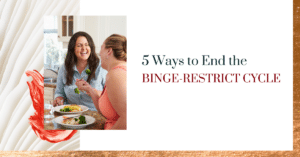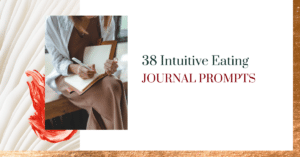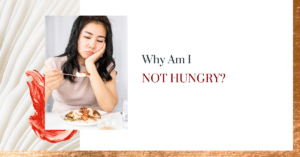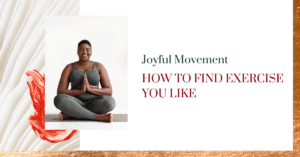5 Ways to End the Binge Restrict Cycle
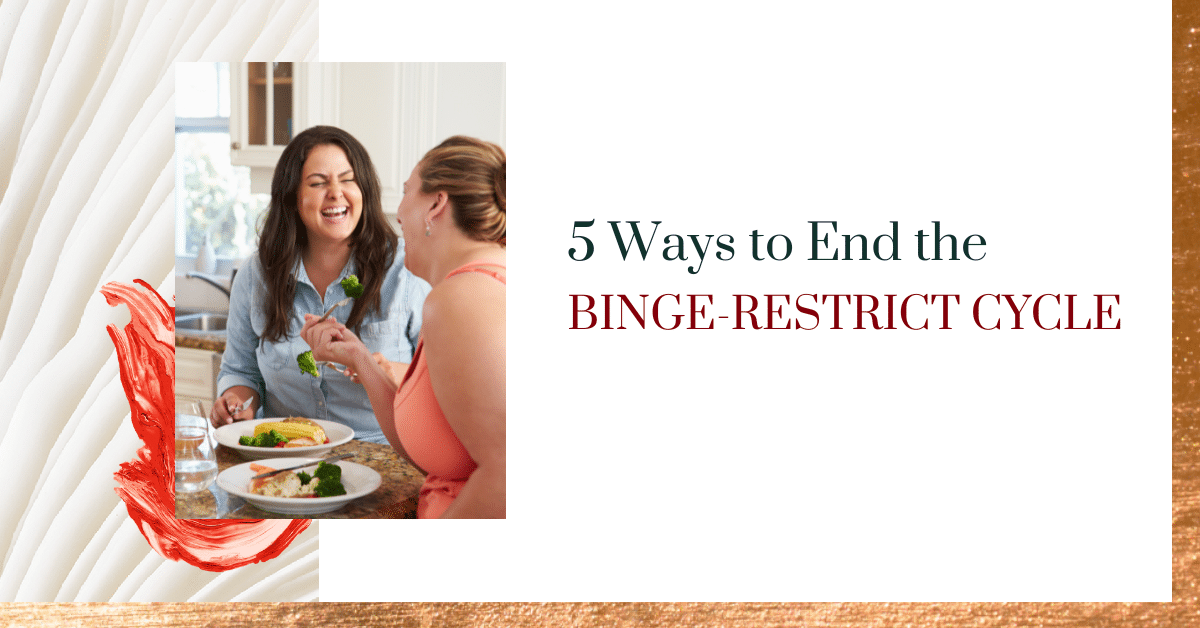
The binge-restrict cycle consists of alternating phases of limiting food intake (restriction), followed by eating large quantities of food (binge eating). This cycle can be distressing and cause a lot of guilt and shame. If you’ve experienced this cycle, you are not alone! Keep reading to learn why this cycle occurs and 5 things you can do to help you stop binging.
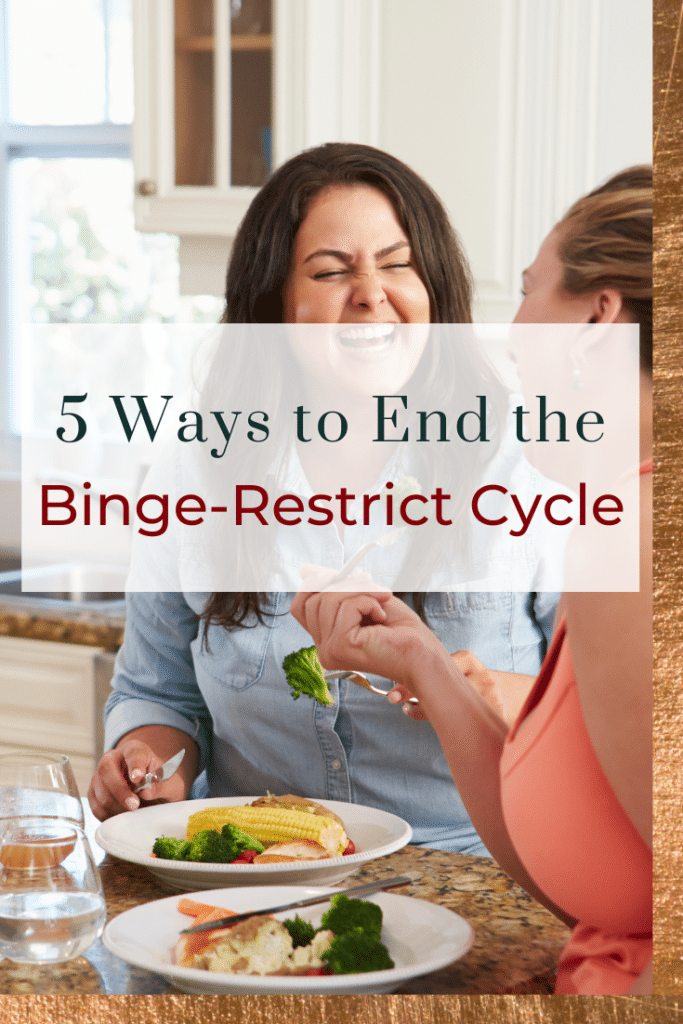
What is the Binge Restrict Cycle?
The binge-restrict cycle consists of alternating phases of limiting food intake (restriction), followed by eating large quantities of food (binge eating).
The restriction phase can include limitations on the amount of food (i.e. portion size, calories, etc) or type of food (i.e. cutting out certain foods or food groups). This phase may involve dieting, skipping meals, cutting calories, rules around what you can or can not eat, and/or compensatory exercise.
When you restrict certain foods or food groups, you may be able to avoid eating those foods for several days or even several weeks, but eventually, your body feels deprived. This is when the binge phase occurs. A “binge” usually means different things to different people, but the common threads include behaviors like:
- Eating more quickly than normal
- Feeling out of control around food
- Eating until you feel uncomfortably full
- Eating large amounts of food even when you’re not physically hungry
Binges may also be related to emotional triggers like stress or anxiety and can serve as a temporary escape or coping mechanism. The binge phase is typically associated with strong feelings of guilt and shame.
A binge phase is then followed by another restrictive phase, where someone tries to get control over their eating and suppress the guilt and shame by following food rules and limiting what they eat. Which eventually again leads to deprivation, and a binge occurs once more; the cycle continues.
The binge-restrict cycle can vary in length. You may experience both in one day, for example, restriction for most of the day followed by binging at night, or you may restrict for weeks or even months before experiencing a binge. While many people will restrict themselves to compensate for the binge or to try to keep themselves from binging, this is counterproductive as food restriction is actually the underlying cause of the binge phase.
The Science Behind Binging
The human body is designed for survival, we evolved that way. Part of surviving means eating enough. That means that when your body detects any sign that there isn’t enough food, it pulls out all the stops to make sure you will eat enough to survive.
When you go on a diet, count calories, or restrict or limit certain foods in any way, your body sees this as a threat to your survival. This is especially the case if you’ve been on and off dieting. The more times you go through the restrict-binge cycle, the more your body becomes wary of starvation, and the more it will try to do everything it can to make sure you eat enough.
Your body responds to food restriction in a variety of ways:
- It decreases your metabolic rate, so you need less calories to function.
- It makes more hunger hormones so that you’ll be hungrier and eat more.
- It makes fewer fullness hormones, so it takes more food to make you feel full.
- It increases your appetite and cravings for calorie-dense food (this is part of why the binges after a period of restriction typically end up being for higher-calorie foods like chocolate, cookies, chips, baked goods, etc.)
5 Ways to Stop the Binge-Restrict Pattern
1. Give Yourself Unconditional Permission.
Restricting food is the main underlying cause of most binge eating. Whenever you limit the amount or type of food you eat, you set your body up to crave more of those foods in the future. The remedy: try to allow yourself unconditional permission to eat (and enjoy – see #4) food. Over time as you release your diet restrictions, it will end the binge-restrict cycle.
Here are some steps you can take to give yourself unconditional permission to eat:
- Notice any diet mentality that you may still be partaking in and letting that go.
- Allow yourself to eat what you want when you want it. (See #2 and #4 below)
- Create abundance with food, both physically and mentally.
- Adjust your language to make all foods neutral.
2. Honor Your Hunger Cues.
Become in tune with the signals your body gives you to tell you it’s hungry, and then honor that hunger by eating something. Hunger can be felt in a variety of ways, and not only by a growling stomach. Some other ways you may sense hunger:
- Energy: Tired, low-energy, sluggish
- Head: Trouble concentrating, headache, dizzy, unable to focus, light-headed
- Mood: Irritable, on edge, cranky (the classic “hanger”)
Ignoring hunger cues or waiting to eat until you are extremely hungry tends to lead to quick and chaotic eating, which can play into the binge-restrict cycle. Getting to know your earlier signs of hunger and eating before you are ravenous helps you build back trust with your body. Over time this increase in trust – that you’ll feed your body when it sends a signal – helps to stop the binge-restrict pattern
3. Eat Consistently and Eat Enough.
If you aren’t eating adequately and consistently throughout the day, your hunger and fullness cues may not be reliable indicators of when to eat and when to stop. A general rule of thumb is to eat three meals per day, plus several snacks. Most people feel best when they eat every three to five hours. If you don’t currently feel hunger cues, it may help to come up with a loose, flexible eating schedule.
Although “enough” will be somewhat different for each person, a good sign that you have eaten a sufficient amount is if you can go several hours without thinking or obsessing about food. Thinking about food is often a sign that your body needs food and is physically hungry. If you find yourself obsessing about food, it’s probably related to not eating enough and to food restriction (see #1).
If you’re unsure whether you’re eating enough, or if increasing the amount of food you eat feels scary or causes you anxiety, this is a great time to meet with a weight-inclusive dietitian who specializes in disordered eating.
4. Choose Satisfying Foods.
In order to feel “done” eating, your body needs to not only be physically full but also satisfied. If you’re not eating foods that you enjoy then you may feel the urge to keep eating, even if your stomach feels full. In general, a satisfying meal includes several components, including:
- A mix of carbohydrates, fat, and protein
- Food(s) that you enjoy and that taste good
Many people skimp on the carbs, which can cause you to not feel satisfied and then end up binging. This is where it’s important to eat enough, of both calories and carbohydrates (see #3 above).
Rather than choosing food based on what you think you “should” eat, choose foods that you enjoy. Consider taste, texture, aroma, appearance, etc. Before each meal, ask yourself: “What do I really want to eat right now? What sounds good to me?” If you’re not sure, that’s okay. Pick something, eat it, and then note how full and satisfied (or not) you feel. With experimentation, you’ll learn what foods and combinations of foods are most satisfying to you.
5. Cultivate a Variety of Coping Tools.
A binge can often be a coping tool to deal with uncomfortable emotions. It’s important to develop other, more positive, and helpful coping tools as you work to end the binge-restrict cycle. By cultivating multiple coping strategies, you can have different tools in your arsenal depending on what part of you needs attending to. Some ideas include:
- Connection tools: call a loved one, go out to dinner with a friend, play with a dog or cat, visit a coffee shop.
- Relaxation tools: take some deep breaths, give yourself a massage, listen to calming music, read a book.
- Pleasure tools: wear a cozy sweater or pajamas, sit in the sunshine, watch a funny TV show.
- Movement tools: go for a walk, dance, do some stretches, clean the house.
Make a list of all of the coping strategies that you can try—including connection tools, relaxation tools, pleasure tools, movement tools, and release tools. Put the list somewhere where you can easily access or see it.
In addition to the tips above, ending the cycle may also involve nutrition therapy and counseling support from a registered dietitian nutritionist and/or a therapist. Healthcare professionals trained in intuitive eating and eating disorder care can help you to establish a more balanced, healthy relationship with food.
Note: the binge-restrict cycle is commonly associated with eating disorders like anorexia and bulimia. If you think you or a loved one might have an eating disorder, contact the Alliance for Eating Disorders for more support and information.
Get More Support Ending the Cycle:
My team and I offer virtual one-on-one nutrition coaching, supporting people with intuitive eating, disordered eating and eating disorders, and more.
You can also start with my online course Unapologetic Eating 101: Foundations of Intuitive Eating Course, a self-paced intuitive eating and body image program to help you liberate yourself from dieting and make peace with food and your body.
Author Bio
The post was written and reviewed by Alissa Rumsey, MS, RD, CDN, CSCS, a registered dietitian and Certified Intuitive Eating Counselor. She specializes in weight-inclusive care, intuitive eating, body image healing, mindfulness, self-compassion, and healing from chronic dieting, disordered eating, and eating disorders. Alissa holds a Bachelor’s Degree in Nutrition and Exercise Science, and a Master’s Degree in Health Communications, and is also an NSCA Certified Strength and Conditioning Specialist.
share the love

about
Alissa Rumsey, RD.
Alissa Rumsey, MS, RD, CDN, CSCS (pronouns she/her/hers) is a registered
dietitian, nutrition therapist, certified intuitive eating counselor, and the author of
Unapologetic Eating: Make Peace With Food and Transform Your Life. Alissa is
passionate about helping people reclaim the space to eat and live,
unapologetically.

A twice-a-month round-up of inspirational stories, lessons, practical tips and encouragement for living your most authentic, unapologetic life.
The Unapologetic Life
RECENT POSTS

The Unapologetic Life
A twice-a-month round-up of inspirational stories, lessons, practical tips and encouragement for living your most authentic, unapologetic life.






